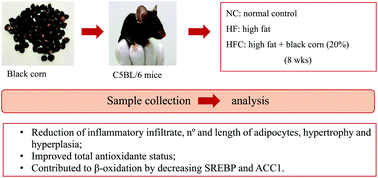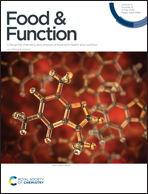Black corn (Zea mays L.) whole flour improved the antioxidant capacity and prevented adipogenesis in mice fed a high-fat diet
Abstract
Black corn (Zea mays L.) is a source of anthocyanins, which have shown the ability to reduce metabolic disorders. This study investigated the anti-inflammatory, antioxidant, and anti-adipogenic preventive effects of black corn. C57BL/6 mice were divided into 3 groups (n = 10): normal control (NC): AIN-93 M; high-fat diet (HF); HF + corn (20%) (HFC). Black corn improved the antioxidant status, through the superoxide dismutase hepatic levels and serum total antioxidant capacity. Animals fed an HFC diet showed decreased gene expression of sterol regulatory element-binding protein-1c (SREBP-1c) and peroxisome proliferator-activated receptor-γ (PPARγ) and increased gene expression of adiponectin and lipoprotein lipase in the adipose tissue, which led to a less inflammatory infiltrate and decreased the adipocyte number and length. In the liver, black corn reduced the gene expression of SREBP-1c and acetyl CoA carboxilase 1. Therefore, black corn whole flour improved the antioxidant capacity, contributed to hepatic β-oxidation, and decreased adipogenesis in animals.



 Please wait while we load your content...
Please wait while we load your content...